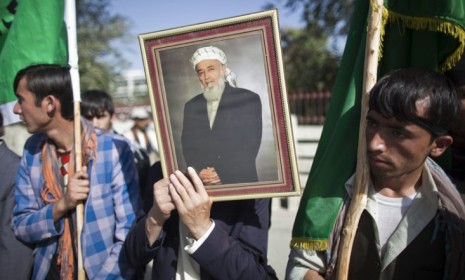Former Afghanistan President Rabbani's assassination: The fallout
A suicide bomber, apparently sent by the Taliban, kills the head of Afghanistan's peace council. Is there any hope for reconciliation now?

A free daily email with the biggest news stories of the day – and the best features from TheWeek.com
You are now subscribed
Your newsletter sign-up was successful
Afghans are gathering in Kabul to mourn former president and peace negotiator Berhanuddin Rabbani, who was killed at his home Tuesday when a man believed to be a Taliban emissary detonated a bomb tucked inside his turban. Rabbani's death is just the latest in a string of assassinations of Afghan leaders, including President Hamid Karzai's half-brother and other prominent allies. Will this destroy any chance of reconciliation between the Taliban and the Afghan government? Here, four predictions on what the killing means for Afghanistan's future:
1. The peace talks are finished
The hope was that Rabbani "could bring some legitimacy" to Karzai's High Peace Council, says Candace Rondeaux, the Crisis Group's senior Afghanistan analyst, as quoted by CNN. Rabbani was a "towering figure in Afghan history" — he fought the Soviets, became president when they left, and became a leader of the Northern Alliance when the Taliban took over. His assassination, "coming on the heels of the attacks last week in Kabul on the U.S. Embassy," probably signals "the end or perhaps the paralysis of what was a very shaky peace process."
The Week
Escape your echo chamber. Get the facts behind the news, plus analysis from multiple perspectives.

Sign up for The Week's Free Newsletters
From our morning news briefing to a weekly Good News Newsletter, get the best of The Week delivered directly to your inbox.
From our morning news briefing to a weekly Good News Newsletter, get the best of The Week delivered directly to your inbox.
2. Afghanistan will become even more divided
Rabbani's death will "increase resentment and anxiety among other Northern Alliance leaders who oppose political deals with the Taliban and accuse Karzai of cozying up to the terrorists," says Ahmad Majidyar at The American. As Karzai and the U.S. "stepped up efforts to make a compromise with the Taliban to end the war," ethnic Tajik veterans of the fight against the mostly Pashtun Taliban have been busy re-arming. The latest assassination will only widen the ethnic divide, which could "trigger a civil war once the foreign troops leave the country by 2014."
3. A civil war may have already begun
The bomb that killed Rabbani "may turn out to be an opening shot" in the civil war so many Afghans have been expecting, says Dexter Filkins at The New Yorker. Many Tajiks and members of other ethnic minorities, such as the Uzbeks and Hazaras, have long questioned whether reconciliation with the Taliban was possible — now they might conclude it's not "even desirable."
A free daily email with the biggest news stories of the day – and the best features from TheWeek.com
4. Actually, this won't change the big picture
"It is important not to overreact" to this tragic news, says Michael O'Hanlon at CNN. "The peace talks with the Taliban were not progressing to begin with," because the Taliban leadership never really wanted peace. "If there is a silver lining here, perhaps fewer people will have unrealistic hopes about the near-term prospects" that Mullah Omar and his inner circle will suddenly embrace reconciliation. Stabilizing Afghanistan was always going to be a "day-to-day and month-to-month slog," and it still is.
-
 American universities are losing ground to their foreign counterparts
American universities are losing ground to their foreign counterpartsThe Explainer While Harvard is still near the top, other colleges have slipped
-
 How to navigate dating apps to find ‘the one’
How to navigate dating apps to find ‘the one’The Week Recommends Put an end to endless swiping and make real romantic connections
-
 Elon Musk’s pivot from Mars to the moon
Elon Musk’s pivot from Mars to the moonIn the Spotlight SpaceX shifts focus with IPO approaching